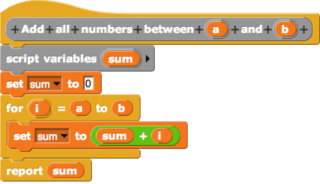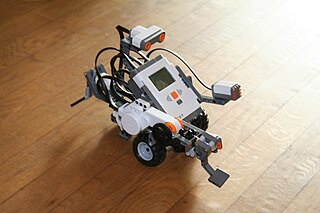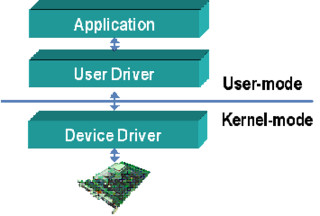Related Research Articles

Qt is a cross-platform application development framework for creating graphical user interfaces as well as cross-platform applications that run on various software and hardware platforms such as Linux, Windows, macOS, Android or embedded systems with little or no change in the underlying codebase while still being a native application with native capabilities and speed.

Computer operating systems (OSes) provide a set of functions needed and used by most application programs on a computer, and the links needed to control and synchronize computer hardware. On the first computers, with no operating system, every program needed the full hardware specification to run correctly and perform standard tasks, and its own drivers for peripheral devices like printers and punched paper card readers. The growing complexity of hardware and application programs eventually made operating systems a necessity for everyday use.
Cocoa is Apple's native object-oriented application programming interface (API) for its desktop operating system macOS.
In computer engineering, a hardware description language (HDL) is a specialized computer language used to describe the structure and behavior of electronic circuits, usually to design application-specific integrated circuits (ASICs) and to program field-programmable gate arrays (FPGAs).
Csound is a domain-specific computer programming language for audio programming. It is called Csound because it is written in C, as opposed to some of its predecessors.
Digital waveguide synthesis is the synthesis of audio using a digital waveguide. Digital waveguides are efficient computational models for physical media through which acoustic waves propagate. For this reason, digital waveguides constitute a major part of most modern physical modeling synthesizers.

In computing, a visual programming language, also known as diagrammatic programming, graphical programming or block coding, is a programming language that lets users create programs by manipulating program elements graphically rather than by specifying them textually. A VPL allows programming with visual expressions, spatial arrangements of text and graphic symbols, used either as elements of syntax or secondary notation. For example, many VPLs are based on the idea of "boxes and arrows", where boxes or other screen objects are treated as entities, connected by arrows, lines or arcs which represent relations. VPLs are generally the basis of Low-code development platforms.

XNU is the computer operating system (OS) kernel developed at Apple Inc. since December 1996 for use in the Mac OS X operating system and released as free and open-source software as part of the Darwin OS, which, in addition to being the basis for macOS, is also the basis for Apple TV Software, iOS, iPadOS, watchOS, visionOS, and tvOS.
WebKit is a browser engine primarily used in Apple's Safari web browser, as well as all web browsers on iOS and iPadOS. WebKit is also used by the PlayStation consoles starting with the PS3, the Tizen mobile operating systems, the Amazon Kindle e-book reader, Nintendo consoles starting with the 3DS Internet Browser, and the discontinued BlackBerry Browser.
Quantum programming is the process of designing or assembling sequences of instructions, called quantum circuits, using gates, switches, and operators to manipulate a quantum system for a desired outcome or results of a given experiment. Quantum circuit algorithms can be implemented on integrated circuits, conducted with instrumentation, or written in a programming language for use with a quantum computer or a quantum processor.

Lego Mindstorms NXT is a programmable robotics kit released by Lego on August 2, 2006. It replaced the Robotics Invention System, the first-generation Lego Mindstorms kit. The base kit ships in two versions: the retail version and the education base set. It comes with the NXT-G programming software or the optional LabVIEW for Lego Mindstorms. A variety of unofficial languages exist, such as NXC, NBC, leJOS NXJ, and RobotC. A second-generation set, Lego Mindstorms NXT 2.0, was released on August 1, 2009, with a color sensor and other upgrades. The third-generation EV3 was released in September 2013.
Carbide.c++ is a software development tool for C++ development on Symbian OS. It is used to develop phones that use the OS, as well as applications that run on those phones. It is based on the Eclipse IDE platform enhanced with extra plug-ins to support Symbian OS development. The product is provided by the Symbian Foundation under an open source model. In April 2009, Nokia transferred Carbide.c++ and many other software developer tools to the Symbian Foundation. Members of the Symbian community now manage and contribute code to the Carbide.c++ product.

ARToolKit is an open-source computer tracking library for creation of strong augmented reality applications that overlay virtual imagery on the real world. Currently, it is maintained as an open-source project hosted on GitHub.

The Symbian Foundation was a non-profit organisation that stewarded the Symbian operating system for mobile phones which previously had been owned and licensed by Symbian Ltd. Symbian Foundation never directly developed the platform, but evangelised, co-ordinated and ensured compatibility. It also provided key services to its members and the community such as collecting, building and distributing Symbian source code. During its time it competed against the Open Handset Alliance and the LiMo Foundation.
Gnuspeech is an extensible text-to-speech computer software package that produces artificial speech output based on real-time articulatory speech synthesis by rules. That is, it converts text strings into phonetic descriptions, aided by a pronouncing dictionary, letter-to-sound rules, and rhythm and intonation models; transforms the phonetic descriptions into parameters for a low-level articulatory speech synthesizer; uses these to drive an articulatory model of the human vocal tract producing an output suitable for the normal sound output devices used by various computer operating systems; and does this at the same or faster rate than the speech is spoken for adult speech.
This page is a comparison of electronic design automation (EDA) software which is used today to design the near totality of electronic devices. Modern electronic devices are too complex to be designed without the help of a computer. Electronic devices may consist of integrated circuits (ICs), printed circuit boards (PCBs), field-programmable gate arrays (FPGAs) or a combination of them. Integrated circuits may consist of a combination of digital and analog circuits. These circuits can contain a combination of transistors, resistors, capacitors or specialized components such as analog neural networks, antennas or fuses.

Symbian was a mobile operating system (OS) and computing platform designed for smartphones. It was originally developed as a proprietary software OS for personal digital assistants in 1998 by the Symbian Ltd. consortium. Symbian OS is a descendant of Psion's EPOC, and was released exclusively on ARM processors, although an unreleased x86 port existed. Symbian was used by many major mobile phone brands, like Samsung, Motorola, Sony Ericsson, and above all by Nokia. It was also prevalent in Japan by brands including Fujitsu, Sharp and Mitsubishi. As a pioneer that established the smartphone industry, it was the most popular smartphone OS on a worldwide average until the end of 2010, at a time when smartphones were in limited use, when it was overtaken by iOS and Android. It was notably less popular in North America.

Device drivers are programs which allow software or higher-level computer programs to interact with a hardware device. These software components act as a link between the devices and the operating systems, communicating with each of these systems and executing commands. They provide an abstraction layer for the software above and also mediate the communication between the operating system kernel and the devices below.

Qiskit is an open-source software development kit (SDK) for working with quantum computers at the level of circuits, pulses, and algorithms. It provides tools for creating and manipulating quantum programs and running them on prototype quantum devices on IBM Quantum Platform or on simulators on a local computer. It follows the circuit model for universal quantum computation, and can be used for any quantum hardware that follows this model.
References
- ↑ "The Synthesis ToolKit in C++ (STK)".
- ↑ "The Synthesis ToolKit in C++ (STK)".
- ↑ "Google Code Archive - Long-term storage for Google Code Project Hosting".
- ↑ Georg Essl, Michael Rohs, Mobile STK for Symbian OS Deutsche Telekom Laboratories, TU-Berlin